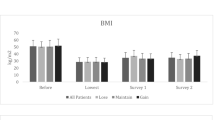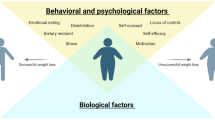Abstract
Background
Recent research has shown that satisfaction with weight loss is predictive of weight loss maintenance, yet empirical evidence for how people derive satisfaction with weight loss is quite limited.
Purpose
To determine whether satisfaction with weight change systematically covaries with various weight-loss-related outcomes and experiences (e.g., improvement in physical appearance, amount of frustration experienced), which outcomes and experiences are the strongest longitudinal correlates of satisfaction, and whether the longitudinal covariations are due to between-person differences and/or within-person changes.
Methods
We analyzed longitudinal data obtained from overweight or obese individuals enrolled in a weight-loss program who were followed for 18 months using random coefficient models.
Results
In univariate analyses controlling for the amount of weight people lost, nine of ten outcomes and experiences independently covaried with people’s satisfaction, and the models accounted for 21–38% of the within-person variance in satisfaction. In a multivariate analysis, four outcomes and experiences remained as significant longitudinal covariates of satisfaction. In both sets of analyses, there were more significant relations due to within-person changes than to between-person differences.
Conclusions
The results suggest that people’s weight loss satisfaction systematically covaries with ongoing changes in weight-loss-related outcomes and experiences. The findings help elucidate how people derive satisfaction with weight loss.
Similar content being viewed by others
Notes
To be sure, the robustness of the estimates produced by these models assumes that the missing data meet the assumption of missing at random (MAR [23]). The most likely violation of the MAR assumption in these data is if people who were less successful losing weight stopped completing questionnaires. If weight loss success was a major source of missing data (i.e., only those who were successful continued to complete questionnaires), we would expect (1) the mean level of weight loss percentage to increase over time, (2) the variability in weight loss percentage to decrease over time, and (3) the number of people completing questionnaires to decrease over time. It is also possible that these expected changes eventually asymptote. An inspection of the percent change from baseline weight reported in Table 1 reveals that (1) the mean level of weight loss percentage shows an increasing trend over time, (2) the variability in weight loss percentage actually increases over time, and (3) the number of people providing weight data shows a decreasing trend, but actually increases over the final two time points. Taken together, these data suggest that there was variability in weight loss success among the people who completed questionnaires over time and there were people who returned to completing questionnaires after prior non-response. We think this evidence supports the credibility of the MAR assumption.
We have not reported estimates of between-person variance because the meaning of the between-person variance components (i.e., intercepts and rates of change) changes between different models that includes time-varying predictors (as the models reported here do). Thus, there is no meaningful way to interpret changes in the between-person variance components from model to model (see [22]).
All the coefficients reported in the paper should be interpreted as the association between the respective variable and satisfaction at the average levels of all the covariates.
References
Jeffery RW, Brewnowski A, Epstein LH, et al. Long-term maintenance of weight loss: Current status. Health Psychol. 2000; 19: 5s-16s.
Wing RR, Phelan S. Long-term weight loss maintenance. Am J Clin Nutr. 2005; 82: 222s-225s.
Rothman AJ. Toward a theory-based analysis of behavioral maintenance. Health Psychol. 2000; 19: 64s-69s.
Rothman AJ, Baldwin AS, Hertel AW. Self-regulation and behavior change: Disentangling behavioral initiation and maintenance. In: Baumeister R, Vohs K, eds. Handbook of Self-Regulation: Research, Theory, and Applications. New York: Guilford Press; 2004: 130-148.
Kumanyika SK, Bowen D, Rolls BJ, et al. Maintenance of dietary behavior change. Health Psychol. 2000; 19: 42s-56s.
Marcus BH, Forsyth LH, Stone EJ, et al. Physical activity behavior change: Issues in adoption and maintenance. Health Psychol. 2000; 19: 32s-41s.
Finch EA, Linde JA, Jeffery RW, Rothman AJ, King CM, Levy RL. The effect of outcome expectations and satisfaction on weight loss and maintenance: Correlational and experimental analyses—A randomized trial. Health Psychol. 2005; 24: 608-616.
Jeffery RW, Linde JA, Finch EA, Rothman AJ, King CM. A satisfaction enhancement intervention for long-term weight loss. Obesity. 2006; 14: 863-869.
Foster GD, Phelan S, Wadden TA, Gill D, Ermold J, Didie E. Promoting more modest weight losses: A pilot study. Obes Res. 2004; 12: 1271-1277.
Baldwin AS, Rothman AJ, Hertel AW, et al. Specifying the determinants of the initiation and maintenance of behavior change: An examination of self-efficacy, satisfaction, and smoking cessation. Health Psychol. 2006; 25: 626-634.
Leventhal H, Cameron L. Behavioral theories and the problem of compliance. Pat Educ Couns. 1987; 10: 117-183.
Leventhal H, Nerenz DR, Steele DJ. Illness representations and coping with health threats. In: Baum A, Singer J, eds. A Handbook of Psychology and Health. Hillsdale: Erlbaum; 1984: 219-252.
Foster GD, Wadden TA, Vogt RA, Brewer G. What is reasonable weight loss? Patients’ expectations and evaluations of obesity treatment outcomes. J Consult Clin Psychol. 1997; 65: 79-85.
Gorin AA, Pinto AM, Tate DF, Raynor HA, Fava JL, Wing RR. Failure to meet weight loss expectations does not impact maintenance in successful losers. Obesity. 2007; 15: 3086-3090.
Klem ML, Wing RR, McGuire MT, Seagle HM, Hill JO. A descriptive study of individuals successful at long-term maintenance of substantial weight loss. Am J Clin Nutr. 1997; 66: 239-246.
Rejeski WJ, Rocht BC, Messier SP, Morgan T, Pahor M, Penninx B. Obese, older adults with knee osteoarthritis: Weight loss, exercise, and quality of life. Health Psychol. 2002; 21: 419-426.
Foster GD, Wadden TA, Vogt RA. Body image in obese women before, during, and after weight loss treatment. Health Psychol. 1997; 16: 226-229.
Jeffery RW, Kelly KM, Rothman AJ, Sherwood NE, Boutelle KN. The weight loss experience: A descriptive analysis. Ann Behav Med. 2004; 27: 100-106.
Byrne S, Cooper Z, Fairburn C. Weight maintenance and relapse in obesity: a qualitative study. Int J Obes. 2003; 27: 955-962.
Tell GS, Jeffery RW, Kramer FM, Snell MK. Can self-reported body weight be used to evaluate long-term follow-up of a weight-loss program? J Am Diet Assoc. 1987; 87: 1198-1201.
Collins LM, Schafer JL, Kam C. A comparison of inclusive and restrictive strategies in modern missing data procedures. Psychol Methods. 2001; 6: 330-351.
Singer JD, Willett JB. Applied longitudinal data analysis: Modeling change and event occurrence. New York: Oxford University Press; 2003.
Little RJA. Modeling the dropout mechanism in repeated-measures studies. J Am Stat Assoc. 1995; 90: 1112-1121.
Baldwin AS, Rothman AJ, Hertel AW, Keenan NK, Jeffery RW. Longitudinal associations between people’s cessation-related experiences and their satisfaction with cessation. Psychol Health. 2009; 24: 187-201.
Wilcox S, Castro CM, King AC. Outcome expectations and physical activity participation in two samples of older women. J Health Psychol. 2006; 11: 65-77.
Author information
Authors and Affiliations
Corresponding author
Additional information
This research was supported by National Institute of Neurological Disorders and Stroke Grant R01-NS38441.
About this article
Cite this article
Baldwin, A.S., Rothman, A.J. & Jeffery, R.W. Satisfaction with Weight Loss: Examining the Longitudinal Covariation Between People’s Weight-loss-related Outcomes and Experiences and Their Satisfaction. ann. behav. med. 38, 213–224 (2009). https://doi.org/10.1007/s12160-009-9148-x
Received:
Published:
Issue Date:
DOI: https://doi.org/10.1007/s12160-009-9148-x




